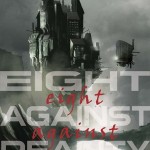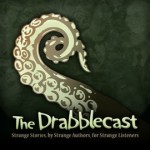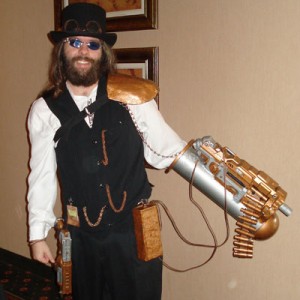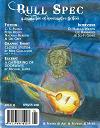written by Frank Dutkiewicz
 I’ve sold stories. Dave’s sold stories. A sizable portion of the people reading this blog have sold them as well. Everyone (don’t deny it if you have sold one) couldn’t have done it without help. A friend to give it a look, lend a helping hand, and tell you when you are off your rocker and to change that thing you thought was so clever when you wrote it.
I’ve sold stories. Dave’s sold stories. A sizable portion of the people reading this blog have sold them as well. Everyone (don’t deny it if you have sold one) couldn’t have done it without help. A friend to give it a look, lend a helping hand, and tell you when you are off your rocker and to change that thing you thought was so clever when you wrote it.
Writers never go it alone. Stories are their babies, babies that have had more than one uncle or aunt to help bring it to maturity. Most writers belong to a critique group. Some are large with an open door policy to all that want to join (Critters, Hatrack), while others are exclusive (Codex).
Eight Against Reality is an anthology put together by a very exclusive writers group called Written in Blood. It’s eight members vowed to help each other through thick and thin. So confident are they with each other’s abilities that they all contributed a story for all of us to read.
Let’s just see how good this exclusive club of writers isâ€
The Eminence’s Match by Juliette Wade
Eminence Nekantor is a difficult man to please. If His Eminence isn’t happy, then no one will be happy, and His Eminence is rarely happy. Bureaucrats run from his fury. The house-servants cringe from his cruelty. An entire nation will suffer when His Eminence is on a rampage. The task of pleasing Nekantor, and suffer the brunt of his fury, falls upon his Imbati manservant, a job that proves difficult to fill.
Kurek, an experienced manservant, is the latest to fail. Now the Service Academy must ready another. The Director is set to send one of its top students, but Details Master Arkad believes Xinta is the only one capable of handling His Eminence’s extrinsic need for perfection. Xinta has proved to have trouble dealing with the abuse of the academy, but Arkad senses a quality in him that may be just what His Eminence has desired all along.
The Eminence’s Match is a tale of a powerful man with an obsessive-compulsive disorder that has run amuck. It opens with the reader experiencing Nekantor tormenting his manservant, Kurek. Nekantor expects a level of perfection that any rational person would consider impossible. Trapped in his own sickness, Nekantor seeks to share his misery by making a game of breaking his Imbati manservants’ calm disposition.
The Service Academy is a school designed to teach young men to endure the abuse Grobal noblemen dish out on their manservants. The students must suffer through a gauntlet of physical abuse while a Grobal instructor verbally assaults them. The lessons taught within its walls would be considered felonious in any modern day western society. Xinta is a convincing timid and meek man-child that has been stripped of most of his pride so he will be able to live a life as a human punching bag.
The strength of this story is the characters. The tale is told from four separate points of view with most of it done through Nekantor and Xinta’s eyes. All the people are under an enormous amount of stress. From the start, the reader is led to believe that Nekantor is a spoiled man that is cruel only because it gives him pleasure, but he is in reality suffering from a mental illness that has him on the verge of rendering him incapacitated. The OCD that has consumed him is overwhelming, but not obvious from Nekantor’s perspective. In fact, Ms Wade did such a splendid job that the reader is able to piece together what is wrong with Nekantor without the character being aware of it himself.
The story done from Xinta’s eyes is equally as astounding. The academy challenges its students to defy the ‘turning the other cheek’ axiom they need to adhere to if they are to succeed. Ms Wade offers how such a character could rationalize enduring such an irrational task. I found him convincing and very likeable.
The Eminence’s Match is about insane people set in a crazy circumstance that is told so rational people can sympathize with it all. Juliette Wade managed an impossible task by bringing these people to life and making it all believable. I found the characters delightful and the story powerful, but like the theme of her story, all was not perfect. I have one complaint, and it is a big one.
The tale ended just as the really story was about to begin. The title and plot led me to believe that a titanic battle of wills was about to commence. The story from the first word to the last scene was written as a set up for a classic ‘unstoppable force vs the immovable object’ struggle. Instead, Ms Wade chose a different ending. The resolution was too simple and unsatisfying. I wanted, and expected, more.
The writing in The Eminence’s Match is first class. I loved Ms Wade’s style and her ability to bring her dysfunctional people to life. The story is fitting for an opening act for any best selling anthology.
Kip, Running by Genevieve Williams
Kip is a freerunner. She runs in a future Seattle that has grown tall and is connected with a complex mass-transit system. The races are run through the city’s skyline and the rules are simple; get to the finish line any way you can but you must do it on foot or by riding for free. Kip’s aim is to beat her rival, Narciso, and win the object of her affection in the process, Lily, Narciso’s girlfriend and freerunner groupie.
A freerunner race is a daring and dangerous game. The object of the race is to grab onto anything that moves to get you to the finish line, not unlike what modern day skateboarders do by grabbing the bumpers of passing cars, except this game has a 3-dimensional element to it with mass-transit lines running 80 stories above the ground. The racers give a whole new meaning to the concept of train jumping.
Kip, Running is a rollercoaster of a story. Kip glides through the tall skyline like a flying squirrel in a redwood forest. Following her run is an exciting adventure. Particularly enticing is the futuristic Seattle. The fast-paced city is very different from today, but not so different that it is alien to the reader. I could visualize Kip flying through its skyline, very well done.
Not as exciting is Kip’s obsession with Lily. Kip believes defeating her rival will win his girlfriend’s heart. It becomes the reason for her to risk her life, not the adrenaline surges of leaping from train to slidewalk hundreds of feet above an unseen street. Her obsession dulls the edge of a sharp adventure. It cheapened the thrill of the piece and made me less sympathetic for Kip. The sidebar story set up for a disappointing finish. I cannot remember an ending line that I disliked more. I would have preferred reading ‘The End’ in its place.
Despite my disappointment with the ending, I found Ms Williams’ story telling professionally well done. The writing is very solid and the visual narrative first class. I did enjoy 90% of Kip, Running and can see why it was chosen for this anthology.
The Lonely Heart by Aliette de Bodard
A thin street girl named Xia eyes a statue at Chen’s merchant stall. The girl is reminder of a life Chen escaped, but unlike Chen, Xia has fallen prey to a pimp. Powerless to help her, Chen returns home to the husband that rescued her ten years before and his mother. She tries to put the tormented child, and her pimp’s threatening words, out of her mind. Then Xia appears at her door. Chen is torn between looking out for her family’s best interest and the guilt of Xia’s empty life. But there is more to Xia than meets the eye. Chen has yet to learn how empty of life Xia is.
The Lonely Heart is a sad story that shifts unexpectedly to a creepy one. Chen is portrayed as one of the fortunate early in the story. She was lucky to survive the homeless existence of her youth to become a member of China’s lower middle-class. She is grateful to her husband for rescuing her. Ms Bodard does a masterful job of showing a life that most would find dismal as a blessing.
Xia has an effect on Chen immediately. Her presence tugs at Chen’s conscience. As the story progresses, Xia forces Chen to realize her role in her marriage, and why her husband rescued her long ago. The story would have been great if Ms Bodard would have stuck with this extraordinary theme, but she inserted a twist that I didn’t see coming. High marks for that.
I found The Lonely Heart special. A disguised horror that was so much more. Ms Bodard successfully created a character that is subtly filled with guilt. She set up a convincing past and a unique set of circumstances to make Chen’s choice believable. For anyone else, the price she paid at the end would be too high. Ms Bodard sold me that it wouldn’t be too high for Chen. Masterfully done.
The Flying Squids of Zondor: The Movie Script by Doug Sharp
Commandrix Dron and her valiant (and dense) crew of the Trigon have been saddled to play host to the female prince, and heir to the Tandori crown, Galina. To relieve her indignity of being relegated to a ‘whoremonger’, Dron spots a planet filled with flying squids to take her anger out on. The Planet Zondor is ruled by the giant squid Zondor the Fertile. The squids are a peaceful race (except for the second in command, Zondor 2). The primitive Zondor squids spot the Trigon approaching from deep space (no explanation how they were able to detect it), and do nothing.
Dron instructs her rocket crew to attack and floors it. Galina does her best to yank on the steering wheel (interstellar ships have steering wheels?). They crash on the planet, suffering only 60% casualties in the process. They proceed to attack the palace (the only structure on the planet) and that is when things get really weird.
The Flying Squids of Zondor: The Movie Script is more of a 20 minute skit than a movie script. If written, it would need a lot of actors. There of 17 speaking parts, 32 actually, considering MAN-16 is in fact 16 humans melded into one being. Reading it as a script is odd in itself. The narrative is preachy (just like a script), which made the story fast, as in a blur. Smooth prose was not an objective for this piece.
It is clear that Mr Sharp really wasn’t pitching the next great movie. The story is really a Sci-Fi satire. Well, more of a farce. I believe Mr Sharp was really writing a bit, but not one you would find on Saturday Night Live. I’m guessing Doug was going for more of a Monty Python flavor. The dialog, for example, was way over the top.
Treat Commandrix Den Dron like a whoremonger will you? Hump blatantly in my fearsome Trigon?
Record my vow: I shall wreak dreadful vengeance upon the Tandori crown.
The Flying Squids of Zondor: The Movie Script is simply silly. A silly premise filled with ridiculous characters. Some of the funniest comedies in history are controversial and misunderstood. The more over the top (Three Stooges, Family Guy, Cheech and Chong), the more diverse the opinions will be about them.
Writing funny stories in the fantasy/sci-fi genre is something I like to do, at least I think they’re funny when I write them. I bet Doug thought the same thing when he wrote this.
Humor is subjective, but when you are pushing the line on ridiculous, there is a point when the effort negates the humor. Kind of like when a horror movie goes way over on the gore and screaming women, it ceases to be scary to anyone.
I believe writing this as a movie script was a mistake. Sticking to the tried and true prose of a short story could have made this work. Some jokes need a set up, not much set up here. The Flying Squids of Zondor: The Movie Script is a story of punch lines, but no substance.
Spoiling Veena by Keyan Bowes
Shalini worked hard to make Veena’s birthday special and her best efforts are falling short. The snowfall she ordered became hail. The cake she bought was supposed to be a replica of the Snow Castle, instead they got America’s Congressional Capital. All Shalini wanted for her gender-manipulated daughter, was to make her princess happy. What will make Veena happy may be more change than Shalini expected.
Spoiling Veena is a tale of a parents desire to do what is best for their child. The story explores a future where gender tailoring is a possibility and how it affects the people around them. The author wisely sets the tale inside a future India, where old prejudices still linger in the progressively advancing society. Shalini’s generation is caught between her daughter’s ‘do what makes you happy’ philosophy and her mother’s ‘god intended people to be one way’ morals. The premise is a potential future problem, which makes for good Sci-Fi.
I liked the idea but I didn’t like the author’s decision to write it in a present tense format. The story is written over a time frame that covered a few months. I am not against the present tense style but it didn’t feel right for this one.
I found the ending fitting, one of those little twists that I like. Good idea. The story didn’t bowl me over but did make me think.
Man’s Best Enemy by Janice Hardy
The people of Atlanta, all 98 of them, are expecting this year to be one of the best in a long time, then one of their own falls to a juvie. News that the dogs are near is tragic. Hunters are needed to take it down. Shawna volunteers, but no one wants the doctor’s apprentice to go. Armed with only javelins, bringing down a juvie isn’t always easy. Juvies have a way of becoming adults, and if you aren’t careful, you may find yourself on the wrong end the food chain.
Man’s Best Enemy is set inside an Atlanta a generation removed from a devastating plague. Man’s best friend has become its vicious enemy. Searching for remnants of dwindling supplies is dangerous, but finding an undisturbed store may be worth the risk.
The dogs of Atlanta have grown and are now the top predator. The few people left are holding the downtown area, protecting their dwindling livestock in the abandoned stadiums, and doing their best to rebound in hopes of rebuilding a civilization. Shawna wants to become a hunter like her mother was and brother is. A fallen hunter, and her brother’s infection from a dog bite, has granted her a rare opportunity.
Man’s Best Enemy is hair-raising excitement. The young teens have become the front line defenders against a lion-sized enemy. The people of Atlanta are under siege and are holding the last bit of ground that isn’t overrun by packs of vicious maneaters. Ms Hardy has done a splendid job with this dystopia tale. I found the MC likeable and the Atlanta’s blight believable. I could see why they would be wary of using the last of their guns’ ammunition but found it odd they only brought javelins with them. Spears are easy to make and would do well against even a large dog. The tactics the young defenders used seemed foolish as well. Trying to outrun a predator is just plain suicide.
Although I could poke all kinds of holes in it, I still found Man’s Best Enemy a good story. I liked it.
Love, Blood and Octli by T. L. Morganfield
Ayomichi has found favor with a feathered serpent. Ehecatl is the wind god and gives Ayomichi a gift for her people, creating happiness for all. Ayomichi becomes priestess for her Ehecatl. She discovers that gods do have more than one side to them. Ayomichi and her people learn that gods are like strangers, and that you should be wary when they come bearing gifts.
Love, Blood, and Octli is a fable, a retelling of an Aztec myth. The story is told as Ayomichi grows from a small child to a leader of her tribe. Mankind is changed by Ehecatl’s gifts. Ehecatl himself changes as the story progresses. In the form of a snake, the god molts, and takes on a new personality when he does.
If you are one that can’t get enough of Aesop, than you’ll probably love Love, Blood, and Octli. The story does run a lot longer than a Greek fable and the moral isn’t as clear as the ones reflected in Aesop’s wisdom. In fact, I’m not all sure there is a moral in this tale. Never lose faith, perhaps?
I must say that I think it was a mistake sticking to the fable format. Yes, this was based on a myth, but it could have still been written in a style that was less like a religious lesson than a work of fictional entertainment. I think I would have enjoyed it more if it were.
Dancing by Numbers by Dario Ciriello
Lyra is a dedicated ballerina. She has been working on her focus, concentrating her whole being to find her center of balance, when she slips into another world and different Lyra. She has discovered a new reality, and realizes that she can repeat the process. Lyra becomes an explorer, an explorer of other Lyras. Her friends and workmates worry that she is losing it. When every decision that was ever made can spawn a new reality, losing it becomes just another possibility.
Dancing by Numbers is a new look at alternate universes. Dario Ciriello came up with a concept that makes it seem almost possible. Lyra One (as she comes to call herself) starts a trend. Once combined with her other selves, memories and thoughts become one. The brief visits spur her counterparts to make their own leaps. Lyra One becomes the pebble that starts a ripple in a sea of multi-able universes.
Mr Ciriello’s knowledge of history is a big plus. The universe of a Carthage victory I would have liked to know more about. Too bad he didn’t delve deeper into the different universes for us to learn more.
Alternate universe stories are like time travel ones. Questions that defy the premise arise for readers. For me, the story is too tight. I would have liked more of Lyra(s). The tale is crisp, but brief. I liked the idea and Mr Ciriello’s style, but the tale needed more story for me to fall into it.
Final Thoughts
I envy the Written in Blood writers group for their perseverance. I was once part of a group that attempted the same thing they did. We were about the same size with the same goal; get a group of emerging writers together and work for the benefit of all. Instead of equals that were eager to help each other, we devolved into something like a dysfunctional family sitting together for a disastrous Thanksgiving dinner. The group lasted less than a month. Three years later, Written in Blood is still going strong. Standing ovation for that feat.
Eight Against Reality is a risky endeavor. The separate styles in writing and shifting genres may turn some away. I love reading such anthologies but more than a few gravitate to collections that share a theme that interests them. The only theme to this collection is a shared history between the authors. However, if the only criteria that concerns you is the quality of the writing, then you have nothing to worry about.
I have yet to read an anthology with so many different authors where I liked all the stories. Eight Against Reality does not break that streak. However, rarely will you find the quality of writing this consistently high.
I found almost all the stories professionally done. Two were exceptional, in my opinion.
If you are looking for an example of a character driven story, study Aliette de Bodard’s The Lonely Heart. Ms Bodard took a character who lived a life that I could never envision, and brought her to life for me. Masterfully done.
Juliette Wade’s The Eminence’s Match was that and so much more. Yes, I was disappointed with the end, but only because I was not ready for it to end. Her characters, seeing what they saw and feeling what they felt, made for a powerful reading experience. If I were granted the honor of nominating one story for a major award (Nebula, Hugo, Campbell), I would be placing The Eminence’s Match on my short list of ones to consider at the end of the year.
Eight Against Reality was a pleasure to read. I give this anthology of virtual unknowns a solid recommendation.
 This is the gold award that Frank proudly displays in his home. Emery Huang threw it through his living room window after readingÂFrank’s review of Writers of the Future Vol 25. Frank now plans on reviewing Eugie Foster’s works so he can add a Nebula to his collection.
This is the gold award that Frank proudly displays in his home. Emery Huang threw it through his living room window after readingÂFrank’s review of Writers of the Future Vol 25. Frank now plans on reviewing Eugie Foster’s works so he can add a Nebula to his collection.







